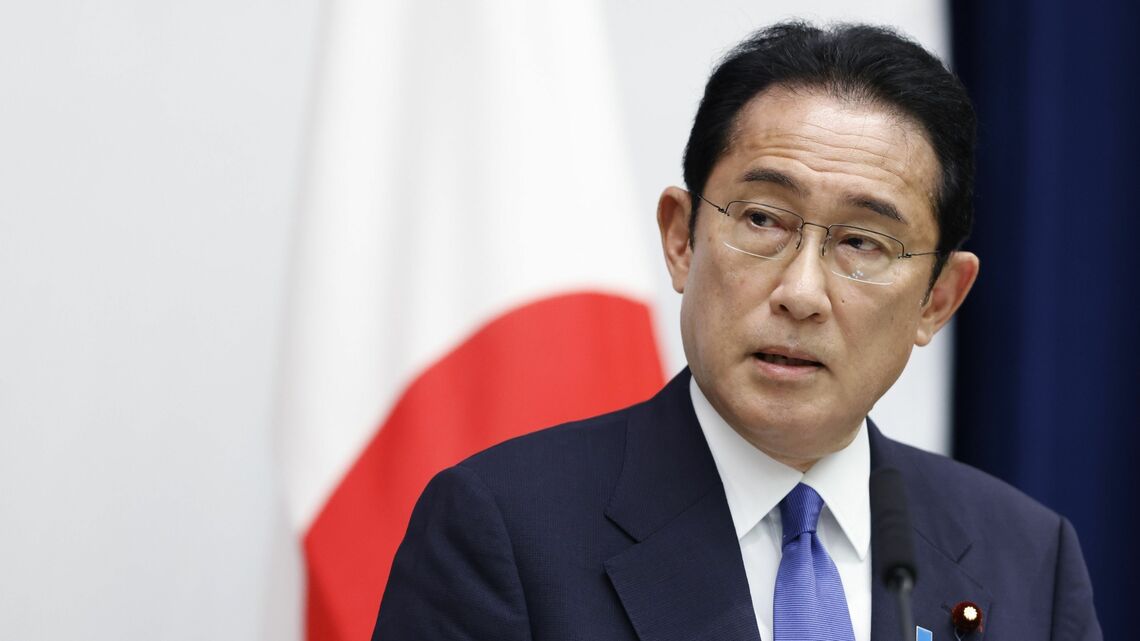Korea Seeks A Breakthrough In Relations With Japan, But Can Tokyo Say Yes? | World | The ORIENTAL ECONOMIST

(Photo By Kiyoshi Ota/Bloomberg)


The declared development this 7 days in Seoul of a governing administration-civil culture advisory team, charged with finding a remedy to the concern of wartime compelled labor, is the latest, and the most important, sign of the dedication of the new Korean authorities to make a breakthrough in relations with Japan.


Following a 7 days of meetings in Korea with senior officers of the Yoon Suk-yeol administration and tutorial and other plan industry experts deeply concerned with Japan, this writer could not come across any person who does not share this aim. It extends throughout the political spectrum, with the exception of hardline leftwing activists and their supporters in the former ruling Democratic get together.


“Restoration of relations with Japan is our priority,” a senior advisor to President Yoon advised me last 7 days. The Yoon govt is stocked with senior officials who are extensive-time advocates of great backlinks with Japan, among the them Foreign Minister Park Jin, deputy countrywide safety advisor Kim Tae-hyo, and the new Amb to Tokyo, Yun Duk-min.


The new govt sees shut ties to Japan as integral to its broader purpose to make Korea a pivotal player in the global struggle of democracies towards authoritarian challengers these kinds of as China and Russia, symbolized by the presence of equally Korean and Japanese leaders at the NATO summit last week.
“We need to boost relations with Japan,” echoed Pak Haksoon, a very well-acknowledged liberal coverage maker, formerly head of the Sejong Institute, a effective thinktank. “I am sorry [former President] Moon Jae-in did not do a thing resourceful towards Japan, so we will give some area to Yoon.”


Whatever leeway the new Korean President has to investigate a pathway to normalization of relations is, nevertheless, minimal. The conservative chief was elected by a traditionally trim margin, and however bolstered by victories in regional elections last month, his popularity is currently slipping. The Democratic party controls the National Assembly and they are not interested in creating his existence less difficult, specially on any proposed compromise on delicate wartime issues.


“People can’t neglect about earlier background,” suggests Pak, who now heads a thinktank devoted to former chief Kim Dae Jung. “If Yoon goes forward without caring about what South Koreans retain deep in their hearts, there will be significant repercussions.”


Tokyo’s Careful Response


Similarly problematic is the mindset of the governing administration of Prime Minister Kishida Fumio which has responded to every overture from Seoul with exceeding warning, if not coldness.


Korean officers stage to some constructive indications, among the them the attendance of Foreign Minister Hayashi Yoshimasa at Yoon’s inauguration and the reception for their transition group delegation in Tokyo.


But Tokyo refused a proposed go to by Korean Overseas Minister Park past month and turned down Korean makes an attempt to manage a serious bilateral meeting at the NATO summit, settling for a quite short exchange at a formal evening meal and a limited trilateral meeting organized by U.S. President Joe Biden.


At that assembly, Kishida created no gestures to personal ties and talked only about a joint reaction to the danger of North Korean nuclear tests.


Korean officials and Japan palms attribute Kishida’s considerably less than a heat response to many aspects. Most level to the impending Higher Household elections and to the ongoing electrical power of far more hardline conservatives in the ruling Liberal Democratic Bash intently tied to previous Key Minister Abe Shinzo, who really don’t see the change in government in Seoul as a significant shift in Korea.


Japanese officials proceed to insist that there can be no real progress right until Korea tends to make a crystal clear 1st step to remove the historical past challenges that loom over the romantic relationship.


“The Japanese were concerned about assembly with out a result,” observed previous South Korean Overseas Minister and Amb to Japan, Yu Myung-hwan. “Kishida is not free of charge from Abe’s impact.” He details to Kishida’s yielding to Abe’s force to force for a UNESCO planet heritage position for a former gold mine on Sado Island which applied wartime Korean pressured laborers.


“Kishida does not differentiate among the left in Korea, which is anti-Japan, and the Korean people today who want to have much better relations,” states Yu, who has been a outstanding advocate of enhanced Korea-Japan relations.


He acknowledges the ongoing undercurrent of anti-Japanese inner thoughts but urges Japan to supply the new government with far more reciprocal and clear support for its attempts. “Kishida really should aid Yoon,” he suggests. “Just to satisfy and shake arms is pretty timid.”


Korean government officials share that annoyance with Japanese caution, however they fully grasp both equally the want to be affected individual and to just take the 1st methods. Senior American officials echo these sights.


In Seoul, there is a great offer of desire in the approaching Japanese elections and the possible destiny of Kishida and of Hayashi, who has been an energetic player in Korea-Japan relations and enjoys fantastic individual relations with senior Koreans.


Kishida’s function in negotiating the 2015 Comfort Gals arrangement – and in persuading Abe to accept that deal – is appreciated by senior Korean officers. But there is also the perception that Kishida feels burned by the collapse of that offer at the palms of the Moon government and is now reluctant to threat a new discount with Seoul.


Locating a street map


The freshly introduced general public-non-public committee is an try to meet up with the Japanese demand from customers for a ‘first action.’ The committee is chaired by Vice International Minister Cho Hyundong, an seasoned formal who is nicely mindful of the troubles in acquiring an satisfactory alternative.


The 12 associates of the committee consist of tutorial professionals, small business figures and, crucially, two attorneys who provide as the authorized agent of the forced laborers. The target is to come up with distinct proposals, types that have the backing of the victims and are probably acceptable to Japan as nicely.


The essential immediate problem is to steer clear of the implementation of courtroom orders to seize the assets of Japanese providers – to begin with, Nippon Metal and Mitsubishi Large Industries – who the Korean courts dominated should pay payment to Koreans who have been compelled to get the job done in their factories and mines during the war.


Asset seizure is a purple line for the Japanese authorities, which has taken the posture that payment issues ended up settled by the 1965 treaty normalizing relations between Korea and Japan and the accompanying settlement on settlement of promises. In idea, the Korean Supreme Courtroom can concern the seizure get at any time. But the backers of this new advisory team believe the courts will maintain off till a remedy is proposed.


“During this period of time, points will be at a standstill and the courts will listen to them,” argues previous foreign ministry official Wi Sung-lac, who served most not too long ago as the best international coverage advisor to the Democratic party’s presidential marketing campaign. “There will be no decide who will go forward and cause the monetization,” he predicts. “It is not a authorized problem.”


According to industry experts associated in building the advisory team, there are quite a few concepts on the desk. One particular approach was to get the victims and their legal professionals to give up their claims but that is regarded as extremely hard – some of the victims are connected to a far more hawkish firm that has already criticized the new team.


Another idea is to return to the arbitration course of action developed into the 1965 treaty, which the Japanese governing administration experienced at first proposed. But this could choose years at best and would not keep off the asset seizure by the court, which has now repudiated the treaty.


The most feasible strategy seems to be to have Korean corporations which benefited from Japanese financial loans and grants delivered in the 1965 treaty – for illustration, Posco, the Korean steel maker – give initial funds for payment. Japanese companies would then be questioned to voluntarily contribute to the fund developed for that reason.


According to previous FM Yu, who has been engaged in this system, legal professionals for the victims are amenable to this answer. They have asked the Japanese governing administration to permit them to talk immediately to the Japanese corporations, which so considerably Tokyo has refused to do, arguing it would undermine the 1965 treaty.


The aim in Seoul is to synchronize this road map to guide to a Yoon-Kishida summit. But that necessitates Kishida and his govt to also take political challenges. Korean senior officials are wanting for some gestures from Japan to relieve the way to a solution.


Just one stage that would signal Japan’s critical fascination in enhancing relations is to take away the remaining controls on Korean exports, imposed all through the downturn in relations with the Moon administration. Yet another is to exhibit “an apologetic attitude” by reaffirming Kishida’s dedication to the Kono statement on ease and comfort gals and the statements of past cupboards on war responsibility.


The important, nonetheless, is a readiness to resume standard bilateral meetings, at all levels.


It is breathtaking to notice that there has been no formal condition visit of a Japanese Key Minister to South Korea considering the fact that the pay a visit to of Kan Naoto in 2010, a dozen a long time back, and no Korean Presidential stop by to Japan since the disastrous assembly in Kyoto in 2011.


The Biden administration’s efforts to force trilateral cooperation by means of triangular conferences on the sidelines of other activities, these as the future G20 overseas ministers assembly, are not a substitute for what need to be normal diplomacy. It would be a lot more helpful for the People in america to quietly drive Japan to answer much more critically to the outreach from South Korea.


“Japan desires to take international minister conferences and large-degree summits conveniently,” states a previous senior Korean formal. “If they don’t do that, the window in South Korea will be shut rather simply.”




